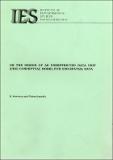| dc.contributor.author | Semwayo, D. | |
| dc.contributor.author | Matambanadzo, P. | |
| dc.date.accessioned | 2015-06-12T09:29:08Z | |
| dc.date.available | 2015-06-12T09:29:08Z | |
| dc.date.issued | 2000 | |
| dc.identifier.citation | Semwayo, D. & Matambanadzo, P. (2000) On the Design of an Unrestricted Data Unit (UDU) Conceptual Model for Geo-Spatial Data, IES Working Paper no. 14, UZ, Mt. Pleasant, Harare: IES. | en |
| dc.identifier.uri | https://opendocs.ids.ac.uk/opendocs/handle/20.500.12413/6320 | |
| dc.description | An IES Working Paper on the design of unrestricted data unit. | en |
| dc.description.abstract | The maturing spatial information sciences have led to greater free flow of spatial information. More than ever before, scientists within and between scientific disciplines appreciate the need to exchange environmental information to avert irreversible environmental disasters, hence the development of environmental information systems.
Existing ecological classification schema are seen as an impediment to environmental data exchange between scientific disciplines. However, this paper will show that the perceived different ecological classification systems, though different, are not as incompatible as they might appear to be. It will be shown that the perceived problem of classification schema incompatibility is one of object definition and data structuring and lack of adequately structured meta-data.
The advent of the Internet and it's associated technologies has led to immense possibilities for data exchange. Coupled with those opportunities are perhaps equally frightening possibilities of the use of data of undefined quality obtained from remote databases lacking adequate documentation on the data -sets.
The development of an elegant data model based on the concept of object hierarchies and their associated behavioral attributes enables the capture, storage, and retrieval of data objects in a way that enables the aggregation of the objects into several ecological classification schema. Such a framework would facilitate the exchange of data between scientists and nations with seemingly different ecological classification systems. By carefully capturing meta-data incorporating it, and propagating it through the different hierarchical schema via the development of supporting logical model constructs, it is hoped that the data model will promote the informed multiple use of data from differently focused ecological classification and aggregation schemes from distributed sources. | en |
| dc.language.iso | en | en |
| dc.publisher | Institute of Environmental Studies (IES) (UZ) | en |
| dc.relation.ispartofseries | IES Working Paper.;No. 14. | |
| dc.rights.uri | http://creativecommons.org/licenses/by-nc-nd/3.0/ | en |
| dc.subject | Environment | en |
| dc.subject | Science and Society | en |
| dc.title | On the Design of an Unrestricted Data Unit (UDU) Conceptual Model for Geo-Spatial Data | en |
| dc.type | Series paper (non-IDS) | en |
| dc.rights.holder | University of Zimbabwe (UZ). | en |


